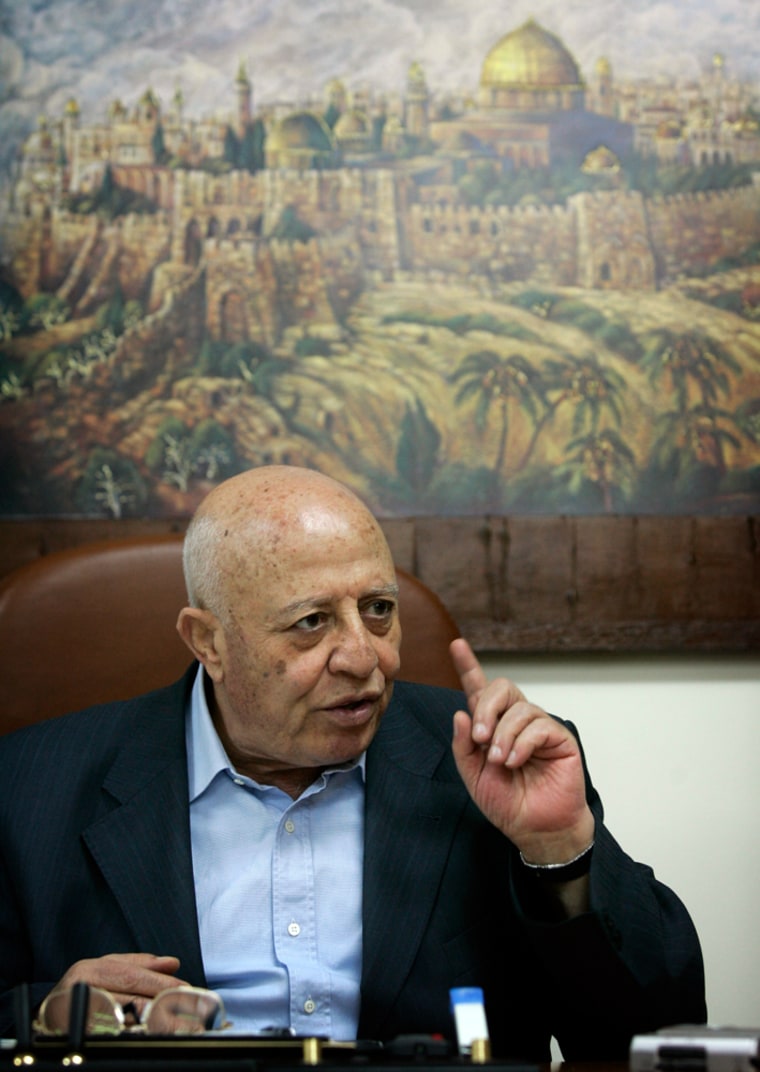The Palestinians are ready to yield parts of the West Bank to Israel if compensated with an equal amount of Israeli territory, the lead Palestinian negotiator told The Associated Press in an interview Wednesday.
Ahmed Qureia, a former prime minister who has dealt with five Israeli prime ministers during 14 years of failed peacemaking, is trying again with No. 6, Ehud Olmert.
And he’s full of optimism, saying the U.S.-hosted Mideast conference in Annapolis, Md., tentatively set for Nov. 26, is a “very, very, very important opportunity.” If it fails, he predicts Israelis and Palestinians will perhaps suffer more than in the blood-soaked years following the unsuccessful Camp David summit in 2000.
Israelis and Palestinians are slowly rebuilding trust, making compromise possible, the 71-year-old Qureia said in his modest office in Abu Dis, a West Bank suburb of Jerusalem that has been sliced in half by Israel’s separation barrier in the West Bank.
Qureia has logged hundreds of hours with Israeli negotiators since 1993, when secret meetings near Oslo, Norway, led to the breakthrough accord of mutual recognition between Israel and the PLO.
Core issues of conflict
Today he heads a four-member team that first met earlier this week with Olmert’s top aides. Ahead of the November conference, the two sides are trying to write a joint declaration of principles on the core issues of the conflict — borders, Jerusalem, settlements and Palestinian refugees.
The disputes have defied solution, but Qureia believes there could be enough common ground to come up with a general sentence or two on how to approach each issue.
For example, the Palestinians want the old Israeli-Palestinian frontier — before Israel captured the West Bank, Gaza and east Jerusalem in the 1967 Mideast War — to be the basis of border talks.
However, Israel will likely ask to keep chunks of east Jerusalem and the West Bank, in order to incorporate hundreds of thousands of settlers who have moved there since 1967. Palestinian leaders are increasingly promoting the idea of a swap, provided they get comparable land in Israel, even though it implies recognition that large Jewish settlements will remain in place.
In a joint declaration, it would be enough to declare the 1967 lines as the starting point, say the border is open to modifications, based on the principle that the Palestinians end up with as much land as they lost in 1967, Qureia said. The exact border would be worked out in negotiations following the Annapolis conference.
Palestinians want territory back
Part of the deal would likely be a land corridor linking the West Bank and Gaza, separated by 25 miles of Israeli territory, but other proposals for the swap have not yet been raised.
Qureia’s boss, Palestinian President Mahmoud Abbas, told Palestine TV Wednesday that the Palestinians want to get back 2,400 square miles of territory.
Asked whether he thought he could get such a commitment from his Israeli counterparts, Qureia said: “Why not? We are still at the beginning. I know that the spirit (atmosphere) is good, from what Abu Mazen (Abbas) told us about his meetings with Olmert.”
In private meetings with Palestinian leaders, Olmert’s main ally, Vice Premier Haim Ramon, has reportedly also advocated the idea of a swap. It would be portrayed as a win-win to skeptics on both sides: Most Israeli settlers would stay where they are, and the Palestinians could say they got all of their land back.
Qureia suggested that on one of the hardest issues, Jerusalem, a declaration would suffice that east Jerusalem will be the capital of Palestine and west Jerusalem the capital of Israel. The sticky details of who would control key holy shrines and where the line of division would run could be dealt with later.
Distrust remains
Ramon proposed handing some Arab neighborhoods of the city to the Palestinians, but was vague about where the line should be drawn. Still, such talk of a possible division had long been taboo in Israel, and Qureia suggested Ramon was testing the public’s reaction to the idea.
If the two sides can come together on the key issues, Annapolis will be a success, Qureia said.
Yet, distrust remains.
Palestinians complain that despite Israel’s public declarations about a willingness to negotiate, it continues to expand Israeli settlements. On Tuesday, Qureia issued a harsh condemnation of Israel after getting word that Israel is moving ahead with a road project the Palestinians fear is intended to tighten Israeli control over strategic West Bank areas near Jerusalem.
If Israel goes ahead with another plan to drive the separation barrier from Jerusalem deep into the West Bank he said “there will be no peace, absolutely not.”
